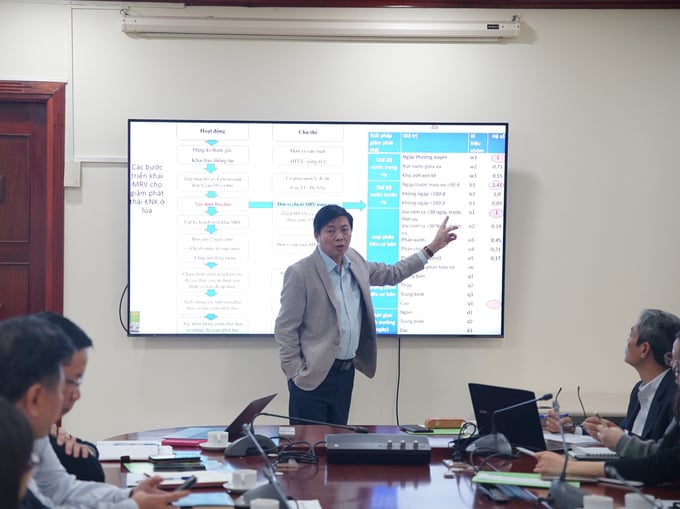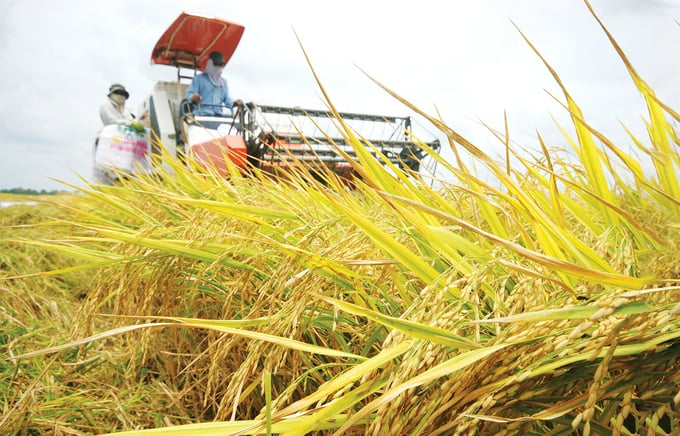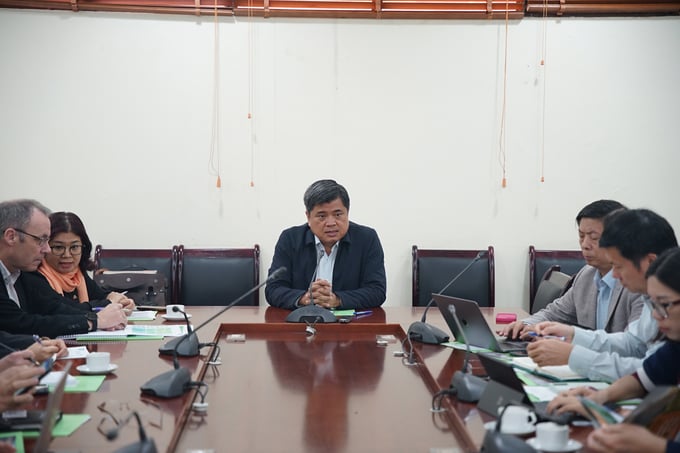November 24, 2025 | 22:09 GMT +7
November 24, 2025 | 22:09 GMT +7
Hotline: 0913.378.918
November 24, 2025 | 22:09 GMT +7
Hotline: 0913.378.918
To carry out the MRV plan, the MARD has directed the Department of Crop Production and the Institute of Agricultural Environment to conduct research, consult, and exchange with various organizations in order to develop a framework for measuring, reporting, and verifying emissions credits for the 1 million hectares of high-quality, low-emission rice project linked to green growth in the Mekong Delta region. In this regard, the Ministry requests IRRI's advice and help in finalizing the strategy.

Associate Professor Dr. Mai Van Trinh, Director of the Institute of Agricultural Environment, shares about the MRV framework.
Associate Professor Dr. Mai Van Trinh, Director of the Institute of Agricultural Environment, discussed the plan framework, stating that the unit has been working with experts from the Transformative Carbon Asset Facility (TCAF) on evaluation criteria for low-emission credits that will serve TCAF credits in the future. Last week, the two parties reached an agreement on greenhouse gas emission reduction options for the 1 million-hectare rice program.
Regarding technical difficulties, legitimate actions in the system from 6 months before planting to harvest include drying the fields before planting, which results in a low emission factor. However, during the 6-month period of flooded fields, a greater emission factor would be generated. During agriculture, there are two water regimes associated with emission reduction: draining water once each crop, which has an emission factor of 0.71 and reduces emissions by 29% when compared to frequent floods. The emission factor for alternating wet and dry irrigation is 0.55, which reduces emissions by 45% as compared to regular flooding.
Associate Professor Dr. Mai Van Trinh also discussed how the straw management regime affects the emission factor. Burying straw 30 days before planting produces a high emission factor. Burying straw before this period, on the other hand, helps to minimize the emission factor by five times. Furthermore, Trinh suggested not to exceed the authorized quantity of nitrogen fertilizer and to pay attention to land leveling operations using machines to prevent negative impacts on the emission reduction process and progress in lowering methane emissions in farming.

Concerning the MRV operational steps, the leadership of the Institute of Agricultural Environment stated that the process would start with cooperatives registering with the local Department of Agriculture and Rural Development, from which the Department will submit the dossier to the Department of Crop Production, which will then propose MRV units to confirm the validity of the dossier before handing it over to the Plant Protection Sub-Department and instructing cooperators.
Each homogenous water and terrain region will be issued an identity card, which will serve as a baseline for water management, fertilizer, organic matter, and straw. MRV units will sign agreements with the Provincial Agricultural Extension Center (each agricultural extension officer oversees two communes) to train, plan modeling, and so on. Following that, agricultural extension staff will enter data into the MRV unit's cloud system to guarantee openness and clarity in each area of the plan.
Regarding technological ideas for developing the MRV system, Mr. Bui Tan Yen, an MRV specialist from IRRI, identified the most difficult part of this system as acquiring vast amounts of field data. Yen said that IRRI is partnering with the Department of Crop Production and the Ministry of Agriculture and Rural Development's Digital Conversion Center to create a digital system for monitoring and reporting rice production status (RiceMoRe) throughout the Mekong Delta's nine provinces.
The system collects real operating data throughout the region at the commune level, including indicators such as weekly seedling area, seed structure, weekly harvesting area, emission-reducing farming practices for each season, and so on. Officials from the Department of Crop Production will report vertically by sector, with data detailed to the commune level. Officials from the Department of Crop Production and Plant Protection Sub-Department at the commune or district levels will enter digital data and submit weekly reports to the cloud system, which will be available to the public.
Yen advocated combining resources from agricultural extension and crop production, as well as commune-level and district-level Plant Protection Sub-Departments, to utilize human advantages in executing the MRV strategy. Furthermore, IRRI is prepared to supply the RiceMoRe system to the Ministry of Agriculture and Rural Development for free in order to carry out the MRV strategy.
Regarding software for extension workers and commune-level officials in charge of reporting, Mr. Tan stated that IRRI has integrated software as well as software that meets the Intergovernmental Panel on Climate Change (IPCC) requirements and can support the Ministry's MRV plan. Furthermore, IRRI recommended creating and extending automated methods rather than depending mainly on human measurement.
Ms. Amber Sharrick, IRRI's sustainable finance specialist, underlined that MRV cannot stand alone and must be linked into other reasons such as carbon credits and engagement with the TCAF system. The MRV system can be connected with benefit-sharing models, but it must also consider resources while engaging in this strategy. Because MRV involves the worldwide market, Vietnam requires international credit verification from a third party.
Responding to IRRI's recommendations, Deputy Minister Tran Thanh Nam remarked that assigning extension staff to each field is fair since cooperatives entering data need instruction on sustainable agricultural techniques and inspections. This workforce will understand and provide the most accurate and efficient data to the Department and Crop Production Sub-Department.

Deputy Minister Tran Thanh Nam desires the support of the International Rice Research Institute (IRRI) in building tools for measuring, reporting, and verifying rice emissions.
Water availability and demand are the most essential issues in sustainable farming. The Deputy Minister believes that IRRI can assist several model farms identified by the Ministry for execution, which can then be replicated across the area.
The Deputy Minister stressed that establishing the MRV procedure is intended to assure the quality of carbon credits before they are exchanged on the carbon market.
"At this point, our emphasis is on piloting and quality. The World Bank has committed to buy all carbon credits from the 1 million acre rice project until 2025 and beyond. "We are currently coordinating with the World Bank and IRRI to ensure the quality coefficients and value of carbon credits before releasing them to the market in the future," said Deputy Minister Tran Thanh Nam.
The Ministry of Agriculture and Rural Development declared that the 1 million hectare project would begin with 185,000 hectares in 2025 and extend to 1 million hectares by 2026, 2027. However, with the enthusiasm of farmers in diverse locations, it is feasible to pilot over 200,000 hectares of rice by 2025. The agriculture industry will prioritize the quality of this first region to assure the quality of future expansions.
Translated by Dieu Linh

(VAN) Viet Nam is entering the pivotal period of 2025-2030, moving toward the formulation of the Remote Sensing Law, which will establish a legal foundation for the development of national digital data.

(VAN) The agricultural sector is finalizing the strategic framework for emission reduction, setting the goal of sharply cutting methane and 403.7 million tons of CO2 equivalent and moving toward Net Zero by 2050.
/2025/11/22/2236-1-153832_483.jpg)
(VAN) The National Marine Spatial Planning is opening up opportunities for sustainable blue sea development across 21 coastal localities.

(VAN) Viet Nam’s forestry sector is undergoing a comprehensive transformation, strengthening management, protection, and development efforts to maintain ecological security and drive green, sustainable growth.

(VAN) Viet Nam is accelerating efforts to digitize reservoir operations, from real-time data to hydraulic modelling.
/2025/11/21/3348-2-102623_454.jpg)
(VAN) National Assembly delegate Nguyen Thi Lan has proposed adding special mechanisms to attract human resources to the agricultural, forestry, and fishery sectors, addressing the shortage of high-quality personnel.

(VAN) Over the past two decades, the unified legal framework for water resource management has been perfected, becoming a crucial foundation for ensuring national water security.